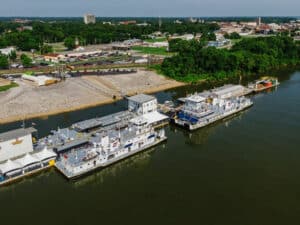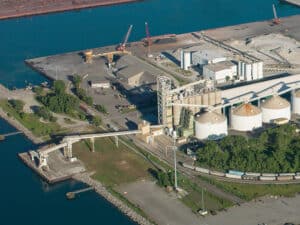
Op-Ed: AWO at 80: Building tomorrow’s legacy
Written by Marine Log Staff
Rick Iuliucci and Kelly Teichman
by Rick Iuliucci, Vice President of the Vane Brothers Company and Chairman of AWO’s Board of Directors, and Kelly Teichman, Chairman of the Board at T&T Marine and Vice Chair of AWO’s Board of Directors.

In 2024, the American Waterways Operators celebrates of 80 years of service as the national trade association for the U.S. tugboat, towboat and barge industry. As our industry’s advocate, resource and united voice for safe, sustainable and efficient transportation on America’s waterways, oceans and coasts, AWO, powered by its diverse membership, has been instrumental in shaping a public policy landscape in which our industry can thrive, continuously improve and build on our many contributions to the nation.
The milestones of the past 80 years in advocating for strong public policy; protecting the safety of mariners, the public and the environment; and telling our inspiring story, have not only helped our industry navigate a complex, dynamic environment, but also laid a strong foundation from which to embrace the challenges and seize the opportunities of the future.
AWO advocacy has resulted in pivotal public policy outcomes that have safeguarded our industry’s fundamental ability to operate: the steady building of strong bipartisan support for the Jones Act that helped us fend off repeated, misguided attacks over the years; the hard-fought battle for a sensible and equitable inland waterways user fee system, and partnership with allies like Waterways Council, Inc. to modernize and maintain our waterways infrastructure; collaboration with our government partners to keep commerce moving safely through hurricanes, low water, a pandemic, and other events; the advancement of practical, consistent regulation that keeps commerce moving efficiently across state lines; and much more.
While all of these will remain industry priorities moving forward, our collective achievements in these areas have created critical space for us to also focus on tomorrow’s advocacy needs, like advancing thoughtful public policy, as articulated by AWO’s CEO-level Sustainability Task Force, to navigate the global drive for environmental sustainability. And as we pursue sustainability and other priorities at the federal level, our industry also faces proliferating challenges in state capitals across the country, which will require widespread engagement in diverse political settings, both to stop bad things from happening and to educate (potential) future federal policymakers.
AWO leadership has also had lasting impact in the critical area of safety. A key pillar of that impact has been the Coast Guard-AWO Safety Partnership, the Coast Guard’s longest-running public-private partnership which embodies and advances our shared commitment to protecting mariners, the public, and the marine environment. This partnership led to the Subchapter M regulations, a milestone that raised the safety bar across our industry while recognizing the tremendous strides companies had already taken by implementing safety management systems such as the AWO Responsible Carrier Program. Collectively, the RCP, Subchapter M, and other key AWO initiatives like the AWO Safety Committees and Safety Statistics Reporting Program, have made a meaningful impact on our industry’s safety performance. The results speak for themselves, with 2022 marking both the second-lowest fatality rate and the second-lowest tank barge oil spill volume (with a spill rate of less than one cup per million gallons transported) ever recorded by the Partnership in its 29-year existence.
Building on the momentum created by these milestones will be critical to continuous improvement and further progress toward zero harm. That will require continued vigilance in strengthening our industry’s relationship with the Coast Guard as safety culture and technology evolve. And the future of improving safety in our industry must also entail prioritization of factors beyond vessel operations, including mariner mental health and crafting of feasible policies to prevent sexual assault and sexual harassment.
An essential component of AWO’s advocacy and safety leadership over the past 80 years has been our efforts to tell our industry’s compelling story, to increase public awareness of marine transportation’s vital work. Thousands of policymakers over the years have heard directly from AWO member companies during our annual Barge-In in Washington DC; and AWO has pioneered the congressional vessel tour, giving hundreds of lawmakers and their staffs firsthand exposure to what it takes to move the nation’s commerce safely, securely and efficiently. And Americans across the country have been educated about our industry’s importance through AWO-generated media coverage of member companies volunteering their time for this important endeavor.
These initiatives have given us a solid foundation from which to strengthen our storytelling in the years ahead, through continuous adaptation to constantly evolving social media, and cultivation of creative partnerships to get our message out to new audiences. This will be especially important as we work to recruit and retain the next generation of mariners and expand into tomorrow’s emerging sectors like offshore wind.
For 80 years, AWO has dedicated itself to building tomorrow’s legacy – championing waterways transport to help our industry navigate today and lead for the future. We are proud to represent two of the many companies that have been part of that story, and we look forward to helping our industry achieve its next milestones through our membership in this indispensable organization.


![Tom Frazier aground and listing to starboard on Feb. 11, 2024. [Photo: U.S. Coast Guard]](https://www.marinelog.com/wp-content/uploads/2025/06/Towboataground-300x225.jpg)

